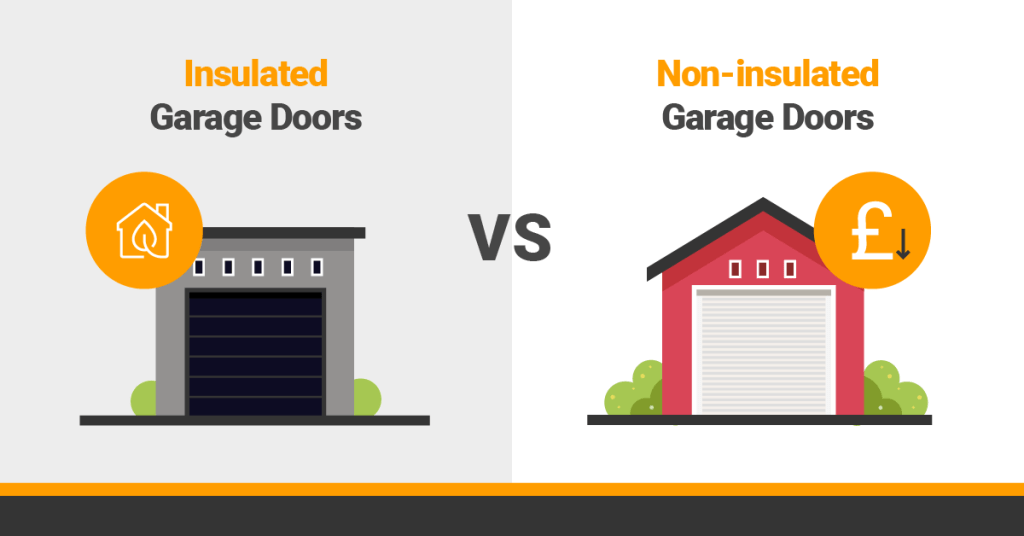When it comes to choosing a garage door for your home, one of the key decisions you’ll need to make is whether to opt for an insulated or non-insulated model. Both types offer their own set of advantages and considerations, making it important to understand the differences between the two before making your selection. In this comprehensive guide, we’ll explore the characteristics of insulated vs non-insulated garage doors, helping you make an informed decision that meets your specific needs and preferences.

Understanding Insulated Vs Non Insulated Garage Doors
Insulated Garage Doors
Insulated garage doors are constructed with added layers of insulation, typically made from materials such as polyurethane or polystyrene. This insulation helps to regulate the temperature inside the garage, providing better thermal efficiency and reducing heat loss or gain. Insulated garage doors are ideal for homes located in regions with extreme temperatures, as they help maintain a more comfortable indoor environment and can potentially lower energy costs.
Non Insulated Garage Doors
Non-insulated garage doors, on the other hand, are constructed with a single layer of steel or aluminum. While they provide basic protection and security for your garage, non-insulated doors lack the added insulation found in their insulated counterparts. As a result, they may not offer the same level of thermal efficiency and may be more susceptible to temperature fluctuations. Non-insulated garage doors are often more affordable than insulated models, making them a budget-friendly option for homeowners.
Read too: The Complete Guide to Tighten Chain On Garage Door Opener for Smooth Operation
Benefits of Insulated Garage Doors
Improved Energy Efficiency
One of the primary benefits of insulated garage doors is their ability to improve energy efficiency. By reducing heat transfer between the interior and exterior of the garage, insulated doors help maintain a more consistent temperature inside the space, reducing the need for heating or cooling and potentially lowering energy costs.
Enhanced Durability and Longevity
Insulated garage doors are often more durable and long-lasting than non-insulated doors. The added insulation provides additional strength and structural integrity, helping the door withstand harsh weather conditions and everyday wear and tear. Additionally, insulated doors may require less maintenance over time, saving you time and money on repairs and replacements.
Increased Soundproofing
In addition to thermal insulation, insulated garage doors also provide better soundproofing qualities compared to non-insulated doors. The added insulation helps absorb sound waves, reducing noise transmission between the garage and the surrounding environment. This can be particularly beneficial if you use your garage as a workshop, home gym, or recreational space.
Considerations for Non Insulated Garage Doors
Affordability
One of the primary reasons homeowners choose non-insulated garage doors is their affordability. Non-insulated doors typically cost less upfront compared to insulated models, making them an attractive option for budget-conscious individuals. However, it’s important to consider the long-term energy savings and potential benefits of investing in an insulated door.
Limited Thermal Efficiency
Non-insulated garage doors may offer less thermal efficiency compared to insulated models. Without added insulation, these doors may allow more heat transfer between the interior and exterior of the garage, leading to increased energy consumption and less comfortable conditions inside the space.
Minimal Soundproofing
Non-insulated garage doors may provide limited soundproofing compared to insulated doors. If you use your garage for activities that require a quiet environment, such as music rehearsals or woodworking, you may experience more noise transmission with a non-insulated door.
Conclusion
When choosing between insulated and non-insulated garage doors, it’s essential to consider your specific needs, budget, and climate conditions. Insulated doors offer superior energy efficiency, durability, and soundproofing qualities, making them an excellent choice for many homeowners. However, non-insulated doors may be more affordable upfront and can still provide adequate protection and security for your garage. By weighing the benefits and considerations of each type, you can make an informed decision that enhances the comfort, efficiency, and value of your home.



Leave a Reply